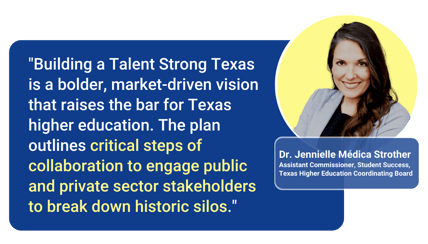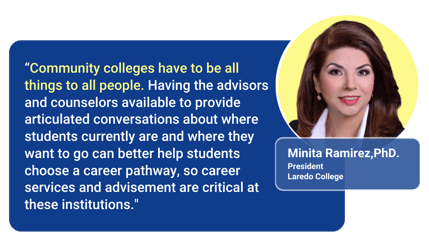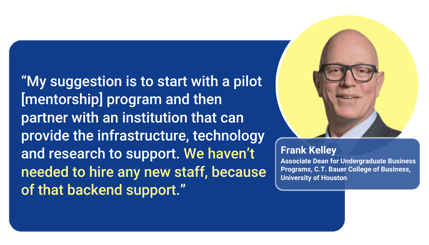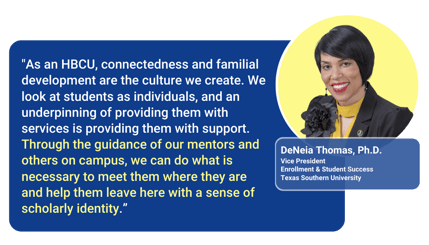The State of Higher Education in Texas: How Texas Universities are Expanding Education Access for Equity
Achieving a sense of purpose and belonging for many college or university students can be challenging to attain, particularly in first-generation and traditionally disadvantaged minority students. The goal for many higher education institutions around the U.S. is to engage these students more fully to improve outcomes in their education and throughout their lives.
On September 20, 2022, Mentor Collective held a virtual roundtable discussion with higher education leaders from around the State of Texas to uncover the strategies they’re using to expand education access and work towards the latest goals of 60x30Tx.
The roundtable included esteemed speakers from a variety of institutions:
- Frank Kelley, Associate Dean for Undergraduate Business Programs, C.T. Bauer College of Business, University of Houston
- DeNeia Thomas, PhD, Vice President of Enrollment & Student Success, Texas Southern University
- Minita Ramirez PhD, President, Laredo College
- Jennielle Médica Strother, EdD, Assistant Commissioner, Student Success, Texas Higher Education Coordinating Board
A New Vision for 60x30Tx
As part of a collaboration between the Texas Higher Education Coordinating Board and the Texas Higher Education Foundation, 60x30Tx rolled out their refreshed strategic plan, Building a Talent Strong Texas, earlier this year to better equip the Texas workforce for the employment needs of tomorrow.
The plan aims to support 60 percent of postsecondary working-age Texans in earning a degree, certificate, or post-secondary credential by 2030 to:
- Build a more educated population with higher rates of student retention
- Increase employment opportunities and income
- Create a deeper talent pool for employers
- Align skills with the jobs the current economy demands
Building a Talent Strong Texas comes on the heels of a changing economy and a restructured employment landscape post-COVID-19.
“As a growing number of jobs in Texas require credentials beyond a high school diploma, we need to upskill and reskill a large portion of our workforce to respond to the needs of employers," said Jennielle Medica Strother, EdD, Assistant Commissioner of Student Success at the Texas Higher Education Coordinating Board
To achieve this goal, Building a Talent Strong Texas was developed after 10 in-depth listening sessions with 500 stakeholders across the state, from education leaders to workforce organizations to policymakers.

The plan also emphasizes equity by including an initiative to track data disaggregated by race, gender, and income.
60x30Tx’s new strategic plan recognizes that Texas’s place as one of the nation’s youngest and most diverse states makes them an ideal candidate to advance their goals equitably—and perhaps even serve as a model for other states.
View Dr. Strother's full keynote presentation on the Building a Talent Strong Texas Plan

Giving Everyone a Seat at the Table
A key theme of the Building a Talent Strong Texas initiative is to think more broadly about who higher education serves; two-year institutions are a critical piece of this puzzle. Two-year institutions across the country enroll more than half of all Latinx and Native American students and half of all Asian American and Black students in higher education.

Many of the roundtable guests agreed that to promote more equitable success in academia and in the workforce, these students often require additional support that higher education institutions must be willing and able to provide.
“Most community colleges have to be all things to all people. Having the advisors and the counselors available to provide articulated conversations about where students currently are and where they want to go can better help students choose a career pathway, so career services and advisement are critical at these institutions. They must be ready to deliver the hard skills and the soft skills required to move students successfully into the workforce or a four-year institution,” said Minita Ramirez, Ph.D., President of Laredo College
Frank Kelley, Associate Dean for Undergraduate Business Programs at the C.T. Bauer College of Business at the University of Houston, echoed Ramirez’s emphasis on prioritizing the academic and people sides for ultimate success.
"When we consider employment, we also must emphasize the soft skills or people skills like teamwork, leadership, technology, communication, critical thinking, diversity, and inclusion, especially for first-generation students. At Bauer, we see it as critically important to have student leaders who demonstrate these skills participating in our pre-enrollment visits and ongoing mentorships," said Kelley.
Increasing Sense of Belonging

To Kelley’s point, multi-tiered mentorship programs can be an excellent way to create and strengthen a sense of belonging among all students. Bauer College had a host of siloed mentorship programs throughout their school, but by partnering with Mentor Collective on a unified pilot program, they expanded their reach and do more with less.
“We already had buy-in from our top leadership—which is important—and we’ve now been able to offer up to 500 near-peer matches between freshmen/sophomores and upper-class mentors, as well as between those same mentors and alumni. Our hope is to have 1,000 mentor matches by November,” says Kelley.

At Texas Southern University, DeNeia Thomas, Ph.D., Vice President of Enrollment and Student Success, says that formalized peer mentoring engagement initiatives are a great way to build connections.
“As an HBCU [Historically Black College or University], connectedness and familial development are the culture we create. We look at students as individuals, and an underpinning of providing them with services is providing them with support. Through the guidance of our mentors and others on campus, we can do what is necessary to meet them where they are and help them leave here with a sense of scholarly identity," said Thomas.
Mentor Collective roundtables encourage conversation and peer-to-peer interaction. The insights offered were valuable to university leaders as we collectively work to ensure student success. Mentor Collective strives to empower every student to form the relationships they need to build resilience, self-efficacy, and a sense of belonging.
The full recording of the roundtable discussion is available here. To start a conversation about how to utilize mentorship to engage and support your students, contact Mentor Collective today.